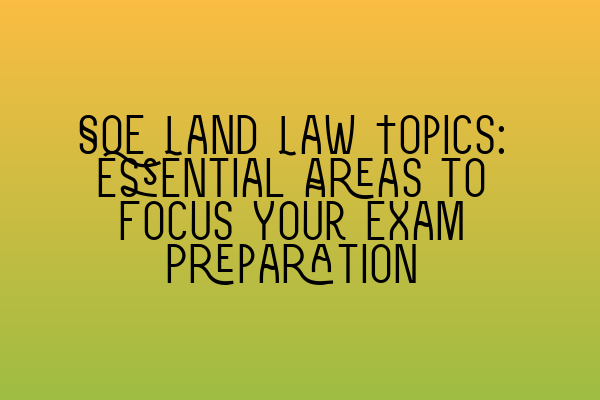SQE Land Law Topics: Essential Areas to Focus Your Exam Preparation
Are you getting ready to take the SQE Land Law exam? As a prospective solicitor, it’s crucial to have a solid understanding of land law principles and concepts. To help you in your exam preparation, we have identified essential areas that you should focus on. In this blog post, we will delve into each of these topics, providing you with valuable insights and tips to excel in your exam.
1. Freehold and Leasehold Estates:
Understanding the different types of land ownership is fundamental in land law. Familiarize yourself with the concepts of freehold and leasehold estates. Be prepared to explain the rights and responsibilities associated with each type of ownership. Additionally, pay attention to the creation, transfer, and termination of leasehold estates.
2. Registered and Unregistered Land:
The distinction between registered and unregistered land is another crucial aspect of land law. Be well-versed in the procedure for registration, including the benefits and drawbacks of registering land. Explore the consequences of failing to register land, as well as the impact of unregistered interests on land transactions.
3. Co-ownership and Trusts:
Co-ownership of land and the principles of trusts are significant topics in the SQE Land Law exam. Gain a good understanding of the different forms of co-ownership, such as joint tenancy and tenancy in common. Furthermore, delve into the principles of trusts and their application in co-ownership scenarios.
4. Easements and Covenants:
Easements and covenants are essential legal mechanisms that govern the rights and obligations associated with land ownership. Take time to study the creation, effects, and termination of easements and covenants. Familiarize yourself with the different types of easements and covenants, as well as the requirements for enforceability.
5. Mortgages and Proprietary Rights:
Mortgages play a significant role in property transactions. Ensure that you understand the legal principles governing mortgages, including the creation, enforcement, and discharge of mortgage rights. Furthermore, explore proprietary rights in land, such as licenses and leases, and their impact on mortgage transactions.
6. Adverse Possession:
Adverse possession is a complex area of land law that involves the acquisition of legal rights through continuous possession of land without the owner’s consent. Study the requirements for adverse possession and be prepared to discuss the implications it has on land ownership disputes.
7. Landlord and Tenant Law:
A solid understanding of landlord and tenant law is crucial for any aspiring solicitor. Study the rights and obligations of landlords and tenants, including the creation and termination of tenancy agreements. Pay attention to the legal framework governing residential and commercial leases, as well as the rights of both parties.
As you prepare for the SQE Land Law exam, consider utilizing additional resources to enhance your studies. Practice exam questions, like those found in the SQE 1 Practice Exam Questions article, can help test your knowledge and identify areas that require further attention. Similarly, engaging in practice mocks, such as the ones available in the SQE 1 Practice Mocks FLK1 FLK2 article, can assist you in familiarizing yourself with the format and structure of the exam.
To supplement your exam preparation, consider enrolling in SQE 1 Preparation Courses and SQE 2 Preparation Courses. These courses are designed to provide you with comprehensive study materials and guidance to excel in your exams.
Stay up to date with SRA SQE Exam Dates to ensure you don’t miss any important deadlines or updates related to the SQE Land Law exam.
In conclusion, achieving success in the SQE Land Law exam requires a thorough understanding of essential topics. By focusing on freehold and leasehold estates, registered and unregistered land, co-ownership and trusts, easements and covenants, mortgages and proprietary rights, adverse possession, and landlord and tenant law, you will be well-prepared to tackle any question that comes your way. Remember to utilize additional resources and seek expert guidance to optimize your exam preparation.
Good luck with your SQE Land Law exam!
